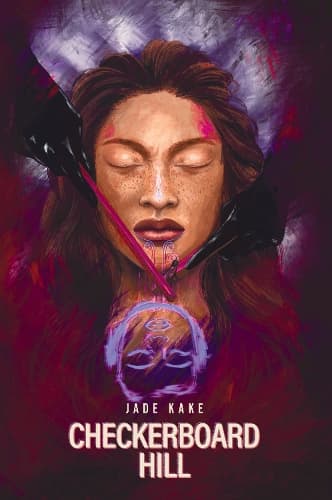Review — Checkerboard Hill
Reviewed by Vaughan Rapatahana
This is an impressive debut novel by Jade Kake. I read it in one sitting and was propelled along – most of the time – by the plot action pushing me to continue to see what would happen next. Well-written with some fine lines such as the later description of Ria, the key protagonist, whilst still in the throes of angst after attending a tangi, ‘Her insides are a broken compass’.
Most of the novel is set in Australia, where Ria flies to from Aotearoa New Zealand when the sudden news of a whānau death reaches her. The fauna and flora of that country are depicted vividly throughout, most especially the dry brown landscapes and the diverse array of native birds on parade surrounding the whānau home, where Ria’s mother, Donna resides.
Indeed, Kake paints her novel as much as pens it: there are colours and textures portrayed throughout, while shades of light, passages of penumbra also pervade the pages. Ria is an artist and these consistent luminary reflections are a direct parallel to her own ongoing conflicts and concerns. Sometimes her mood is even-tempered, more often it is imbrued with darker hues as she has to deal with not only the recent death, but the reactions of her own close-knit family to her initial speedy departure from Australia several years previously and her sudden return there.
Ria is a woman with a past. Her current relationship is with James, with whom she has a son named Ari. They are secondary figures, residing in the background territory of Aotearoa. Ria contacts them infrequently and somewhat brusquely. Ria never comes across as whole throughout almost all of the novel, and is difficult to untangle, primarily because she does not find it easy to understand herself. She is often on the edges of the action, an outsider amongst a cultural rōpū that is itself not mainstream Australian – namely expatriate Māori and Aboriginal Australian – groups who have had, and continue to have, racial prejudice flung in their faces because of who they are. Pākehā are few and far between in this novel, the exception being Ria’s own estranged father, Mick. In fact, men per se, are secondary figures throughout. For example, Nathan, the father of the deceased, does not learn about this paternity until very late in the piece; Mick has a disturbing battle with the bottle at one stage; and the rather saintly James is distant and less developed.
Descriptions of Ria’s continued changes of clothes and frequent bathing episodes suggest she is trying to wash away her anxieties and to literally redress the wrong that she perceives she has initiated. As she states at one stage, ‘I felt like I had been living two lives for so long’. Only towards the final chapters does Ria snap into authenticity, reacting staunchly to the efforts of kaumātua to take the body of the deceased, Michael, elsewhere – and wins over the mass gathering of whānau around the coffin. And only in the final pages, does Ria become whole, when she receives a moko kauae, becoming her true self – the final line of the novel is, ‘When the kaitā holds up a mirror, she smiles. She looks like herself’.
The structure of Checkerboard Hill is a flux of flashbacks, whereby Ria’s earlier life in Australia is revealed as interposed with the current activity depicting the arrival of numerous whānau members to the tangi. Sometimes, these interweavings are a little deceptive and I had to quickly calculate which was past and which was present, especially when characters overlap both – such as many of Ria’s schoolfriends and neighbours, the latter of whom still reside in the neighbourhood. But this is a minor quibble.
Then there is the title. As a long term resident of Hong Kong myself, I know of Checkerboard Hill there, close to the old Kai Tak airport and formerly utilised by pilots as a distinctive guide when they were attempting to land at that difficult-to-access site. I am not quite sure if there is a Checkerboard Hill in Australia, but the connotation is that the overall tapestry of Ria’s life across two countries is similar to a journey across a checkerboard – sudden switches of wāhi and unexpected moves lurk throughout the novel, with unanticipated switches about Michael, the deceased, which I will not betray in this review. I will note, however, that we never do learn how he died.
Finally, a note of congratulation to Jade Kake and to Huia. A fine book. Well-worth purchasing and perusing. And, I am certain, a precursor to several more such from this team. Tēnā koutou katoa.
Reviewed by Vaughan Rapatahana
